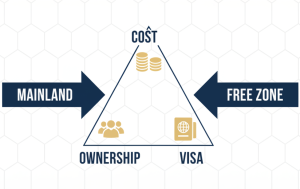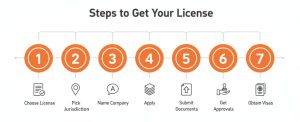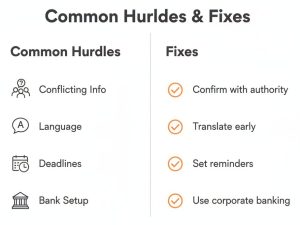Understand UAE Business Licensing
Starting a new venture in the United Arab Emirates (UAE) can feel exciting, but there’s one crucial question you’ll bump into right away: what are the types of business licenses in the UAE, and which one do you actually need? Over the years, the UAE government has defined distinct categories of licenses to ensure businesses comply with local regulations. This structure helps you operate within the right boundaries, whether you’re making products, offering services, or planning a tourist attraction.
In this guide, you’ll learn about the main license types, the basics of how to qualify for each, and a few key considerations for setting up your company smoothly. By the end, you’ll see which option aligns best with your business goals and how you can secure the right paperwork without drowning in red tape.
Know The Main License Types
When you’re looking to register a company in the UAE, you can choose from six primary categories: Industrial, Commercial, Crafts, Tourism, Agricultural, and Professional. Let’s break each license down so you can see if it’s a match for what you have in mind.
Industrial LicenseIf your business relies on manufacturing, processing, or packing goods, the Industrial License is generally the way to go. This license covers a broad range of activities:
Because industrial operations can be large-scale, you may face specific rules around factory space, energy usage, and employee accommodations. You’ll likely need approvals from the relevant authorities in the UAE to meet hygiene and safety codes. Make sure you understand the size of your operation, because you’ll need to account for potential expansion as local guidelines get updated. |
 |
Commercial LicenseAre you planning to trade goods, import or export merchandise, or run a general trading business? That’s where the Commercial License steps in. It includes wide-ranging commercial activities, such as:
Keep in mind that some products, such as pharmaceuticals or certain food items, may require additional permits. It’s also wise to check if your chosen emirate has any extra trade rules you need to follow. If your commercial venture deals with high-volume or specialized goods, you might consider adding compliance services to ensure ongoing adherence to local regulations. |
 |
Crafts LicenseIf you have a knack for design, handcrafting items, or offering maintenance and repair services, the Crafts License might fit the bill. It typically covers:
Craft-based ventures often require smaller premises. However, you should confirm whether the local authorities dictate any health or safety standards, especially if you’re using tools that generate noise or fumes. Think about how you present your craft offerings, because the UAE’s consumer market values both skill and presentation. |
 |
Tourism LicenseThe UAE’s tourism sector is booming, and if you’re looking to tap into that energy, a Tourism License sets you on the right path. Activities under this category can include:
You might need to coordinate with the Department of Tourism and local municipalities in the emirate you plan to operate in. Extra steps, such as obtaining guide certifications or ensuring specific insurance policies, may also be on your to-do list. |
 |
Agriculture LicenseAgriculture might not be the first thing you associate with the UAE, but it’s becoming increasingly significant. If you’re involved in farming, ranching, or producing agricultural goods, then the Agricultural License applies. Common scenarios include:
Given the desert climate, many agricultural ventures adopt advanced technologies like hydroponics or vertical farming. If you plan to produce large quantities of goods, be prepared to meet water use regulations and environmental guidelines. You may also want to explore tax consultancy if you plan to export your agricultural products, as cross-border rules can be complex. |
 |
Professional LicenseThis license primarily caters to specialized skills or services, such as consulting, design, or accountancy. Examples of businesses that require a Professional License include:
Professional License holders often benefit from fewer restrictions on business ownership, especially in mainland areas. Keep in mind, certain professions (like legal or auditing) might require specific qualifications from recognized academic or professional bodies. It’s smart to investigate any local endorsement or membership you need to practice legally. |
 |
Consider Mainland Or Free Zone
Beyond selecting your license type, you’ll also decide whether you want to establish your business in the mainland or in a free zone. Here’s a quick look at how the two compare:
| Feature |
內陸公司 |
自貿區公司 |
|---|---|---|
| Ownership | Can now be up to 100% (in many cases) without a local sponsor, though some activities still need partnership | Usually 100% foreign ownership |
| Scope | Free to trade within the UAE and internationally | Primarily trade within the zone or internationally, with special permits to trade in mainland |
| Office Space | Physical office space often required | Some free zones allow flexible desk or office packages |
| Approvals | Different government departments involved | Typically handled by the free zone authority |
If you’re still unsure, you might check this comparison of mainland vs free zone. Determining which path suits your goals depends on factors like customer base, budget, and your future expansion plans.

Steps To Secure Your License
Once you’ve decided on the license type and location, it’s time to walk through the application process. While each authority has its specific steps, the general outline looks like this:
- Choose License Category
Confirm your business falls under Industrial, Commercial, Crafts, Tourism, Agricultural, or Professional. Double-check any subcategories with the local licensing authority. - Pick Jurisdiction
Decide between mainland or a particular free zone. This choice impacts your ownership structure and the permitted scope of activity. - Select Business Name
Make sure the name hasn’t been registered already and meets UAE naming conventions (no offensive language or references). - Gather Documents
Common requirements include passport copies, a business plan, proof of residence, and, in some cases, professional certifications. - Submit Application
Fill out the official forms and pay the initial fees. If you’re in a free zone, you’ll do this with the zone authority. Mainland applicants deal with the Department of Economic Development (DED) or equivalent authority. - Approvals And License Issuance
Ensure you’ve obtained any extra approvals needed (for example, from the Tourism Department if you’re going down the tourism route). Once everything is set, you receive your license. - Complete Visa Processing
If you require residency visas for yourself or your employees, apply through the relevant channels. The UAE has an e-channel system to streamline processes, so you might consider e-channel registration if you want a quicker approach.

Key Documents And Requirements
Different authorities may request slightly different documentation. However, you’ll typically need:
- Passport copies for all stakeholders
- Recent color photos for official IDs
- Proof of address (like a utility bill)
- Memorandum of Association (MoA) or Service Agent Agreement (for mainland)
- Business plan (especially relevant for free zones or bigger projects)
- Bank reference letter or proof of initial capital (if required)
For certain licenses, specialized approvals come into play. If you’re establishing a crypto trading business license in the UAE, for instance, you might need regulatory clearance from the local financial authorities. In any case, it’s wise to have pro services or concierge services handle paperwork on your behalf if you’re short on time or unfamiliar with the UAE’s administrative systems.
Plan For Smooth Operations
Securing your license is the first step, but think about the long-term health of your business too. Here are a few pointers to help you run a stable operation:
- Consider compliance services to ensure you’re always up to date with local laws.
- If you’re dealing with financial reports or need support in budgeting, look into accounting and bookkeeping.
- For setting up local accounts and payment channels, corporate banking services can simplify your transactions.
- Curious about expansions or sustaining growth? Take a look at how to setup a business in the uae for tips on scaling strategy.
These resources help you avoid costly mistakes, like missing tax deadlines or not renewing essential permits on time. Also, it can be a good idea to explore the cost of business license in dubai if you’re comparing budgets for different business activities.
Tips For Choosing The Right License
Picking the best license category can feel tricky, especially if your business overlaps with multiple areas of activity. Should you register for one license or combine them? Here are a few handy guidelines:
- Align With Core Activities
List out your main revenue streams and see which category they fall under. For instance, if 70% of your income is from consultancy, a Professional License is likely your safest bet, even if you do a little trading on the side. - Check Future Plans
If you anticipate pivoting or adding new product lines, choose a license that allows you to scale or modify activities easily. Industrial operations, for example, might require expansions in factory space, which is easier to do under an Industrial License when the time is right. - Talk To Local Experts
Each UAE emirate may have slight variations in fees, regulations, or sponsor requirements. An in-person consultation or a virtual session with pro services can illuminate details you would otherwise miss. - Budget For Renewal Costs
Every license comes with an annual renewal fee. Some free zones offer package deals, while mainland authorities might have variable rates. Choose an option that fits your long-term financial plan.
Manage Your Licensing Costs
Handling costs effectively is crucial, especially if you aim to maintain a lean operation. While free zones may have bundled packages covering registration, visas, and office space, mainland licensing fees can fluctuate based on your specific activity or location. Don’t forget to budget for add-ons like legal documentation or translations, especially if you’re not fluent in Arabic.
You might also want to consider the advantage of 100% foreign ownership. This can save you from paying a local sponsor a yearly fee. However, ensure that your specific activity falls under the scope of those rules, since not every business category is covered just yet.
Overcoming Common Hurdles
It’s easy to feel overwhelmed. After all, you’re dealing with multiple authorities, each with its own timeline and requirements. Here are a few challenges and how to address them:
- Conflicting Information

You might hear one thing from a friend and another from an official website. Always confirm with the relevant authority or official government sources. If you still feel stuck, consult pro services for clarity. - Language Barriers
While English is widely spoken, certain official documents might be in Arabic. Hiring translation or administrative help early can prevent misunderstandings that lead to rejections or delays. - Keeping Track Of Deadlines
Each step from name reservation to final license issuance has a timeline. Mark your calendar or use reminder apps so you don’t miss crucial deadlines. - Funding And Bank Setup
Opening a local business account sometimes requires an established track record. Corporate banking solutions can simplify your finances, especially if you’re new to the region.
Final Thoughts And Next Steps
Your journey into the UAE business scene starts with choosing the right license. By understanding the categories Industrial, Commercial, Crafts, Tourism, Agricultural, and Professional you can pinpoint exactly where your venture fits. Plus, weighing the differences between mainland and free zone setups helps you figure out the ownership and location structure that suits you best.
Before you dive in, be sure to gather your documents, check relevant regulations, and consider adding a little extra help from compliance services or concierge services. These support systems can smooth out the process, leaving you more time to focus on making your business vision a reality.
Now that you know the core details, what’s your next move? You could brainstorm how your product or service fits under one of these licenses, or explore expansions like crypto trading business license in the uae if you’re eyeing emerging markets. Let yourself dream big the UAE’s flourishing economy can support your goals if you set up your company on the right legal footing.
If you have any go-to tips or memorable experiences with the UAE’s licensing procedures, feel free to share your thoughts. You never know: your insight could be the spark another entrepreneur needs to get started. Enjoy planning your license journey, and remember, it all begins with picking that perfect category for your big idea!








